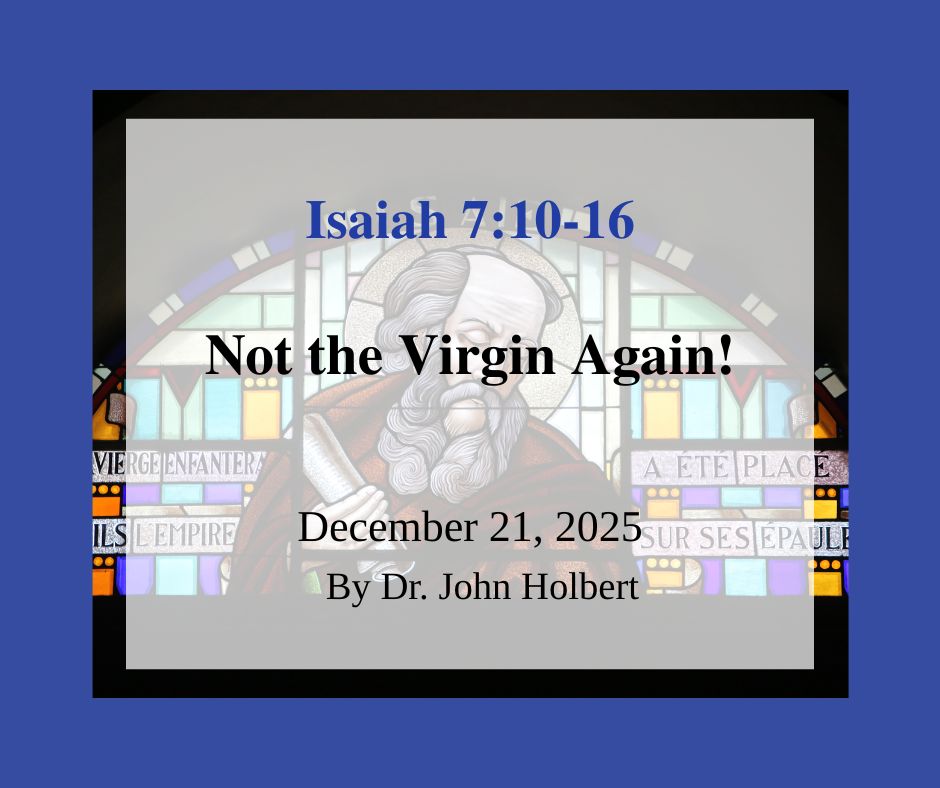Not the Virgin Again - Reflections on Isaiah 7:10-16, Advent 4, Year A
by John C. Holbert on Monday, October 20, 2025

It is quite simple linguistically to demonstrate that the entire biblical superstructure supposedly upholding the “doctrine of the virgin birth” is in reality quite shaky. Or perhaps more clearly said: that building has long ago collapsed. ‘Almah in Hebrew does not, did not, and never did mean “virgin” (that Hebrew word is bethulah); ‘Almah means “a young woman of marriageable age.” But when Matthew read the Greek version of the Hebrew Bible, the so-called Septuagint (LXX), he read the Greek parthenos which on occasion can mean “virgin,” though its meanings are multiple, “young woman” among them. But from such slender supports emerges “the virgin birth,” one of the “five essential beliefs of Christianity,” at least according to those among us who cling to an older form of doctrinal belief. Such a “doctrine” bears no significance for my faith in Jesus Messiah, though I have no intention of forcing my system on you.
What Isaiah may have had in mind in his 8th-century Jerusalem is both historically recoverable and sociologically rather obscure. He is haranguing King Ahaz of Judah, hardly for the first time, about his terror in the face of a coalition of countries that are threatening his kingdom; they are the northern state of Israel and the eastern kingdom of Aram. Isaiah’s intent is to shore up the faith and trust of the king in YHWH. He first asks the trembling monarch, “Ask a sign of YHWH your God; even if it is deep as Sheol or as high as the sky” (Is 7:10). Ahaz will have none of that, being as fearful of YHWH as he is of the military. “I will not ask,” he asks, and adds, with an obvious false piety, “I will not put YHWH to the test.” That latter comment was added with a sanctimonious look and an attempt at a religious visage.
Isaiah, however, sees right through the king’s so-called faith: “Is it such a small thing that you exhaust humans that you must exhaust my God, too?” If you refuse to ask YHWH for a sign, then here comes one anyway! And then Isaiah gives the sign of the young woman who is about to give birth, and will call the child’s name Emmanuel (“God with us”). Now comes the obscure part! “Curds and honey he will eat before (?) he knows to reject the bad and choose the good” (Is.7:15). The problem is that word I have read “before.” Literally, it seems to mean “for (or “to”) his knowing,” which might translate “in order to know;” yet that does not help us much. “Before” is a traditional reading, and may be the best we can do.
Vs.16 is a bit clearer. “Before the child knows to refuse the bad and choose the good, the land before whose two kings you are in dread will be abandoned.” The issue revolves around just how long is that time when this child will “know how to refuse bad and choose good,” a kind of child maturity. Is that three years? Six? Ten? Who can finally know, and every child is certainly different in this, but it is the key to Isaiah’s oracle. At least we can conclude this: the virginal status of the young woman plays no role in the matter at all. Yet, from this odd text, a huge Christian conviction has arisen.
What is a preacher to do with all this? Advent seems hardly the time to argue about the virgin birth! There will be members of every congregation who have been raised with this idea, and as she gazes fondly at the glow of candles, and hears with gladness the strains of those wonderful hymns, if the preacher launches into a reasoned assault on something long cherished, the troubled pew-dweller may make this Sunday her last. Then what are we to do?
Early Christians were intent on making Jesus special and unique. Other great figures of the distant past were said to be born of a virgin: for example, Sargon of Accad, remembered as a significant ancient king (who also was believed to have been saved in a river in a small boat!), was one important figure. Both Matthew and Luke emphasize this virginal birth as a sign of the great significance of Jesus, and perhaps a lesser sign of the importance of Mary, his mother. Neither intended that this unique birth should be a way to prove or disprove the faith of any believer. It is a sad commentary on our deeply rational culture, that demands “proof” of everything no matter the cost, that such a tiny element of our faith history should have served as a source of controversy and conflict through the centuries. I urge you not to wade in the weeds of this confusing and painful struggle on the fourth Sunday of Advent. Allow the winsome sounds of Handel’s “Comfort ye, my people” to soothe and direct our attention to the wonderful story of Jesus about to unfold.
